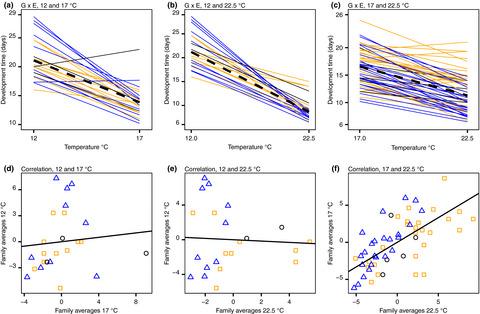当前位置:
X-MOL 学术
›
Ecol. Evol.
›
论文详情
Our official English website, www.x-mol.net, welcomes your feedback! (Note: you will need to create a separate account there.)
Adaptation potential of the copepod Eurytemora affinis to a future warmer Baltic Sea.
Ecology and Evolution ( IF 2.6 ) Pub Date : 2020-05-15 , DOI: 10.1002/ece3.6267 Konrad Karlsson 1, 2 , Monika Winder 2
Ecology and Evolution ( IF 2.6 ) Pub Date : 2020-05-15 , DOI: 10.1002/ece3.6267 Konrad Karlsson 1, 2 , Monika Winder 2
Affiliation

|
To predict effects of global change on zooplankton populations, it is important to understand how present species adapt to temperature and how they respond to stressors interacting with temperature. Here, we ask if the calanoid copepod Eurytemora affinis from the Baltic Sea can adapt to future climate warming. Populations were sampled at sites with different temperatures. Full sibling families were reared in the laboratory and used in two common garden experiments (a) populations crossed over three temperature treatments 12, 17, and 22.5°C and (b) populations crossed over temperature in interaction with salinity and algae of different food quality. Genetic correlations of the full siblings’ development time were not different from zero between 12°C and the two higher temperatures 17 and 22.5°C, but positively correlated between 17 and 22.5°C. Hence, a population at 12°C is unlikely to adapt to warmer temperature, while a population at ≥17°C can adapt to an even higher temperature, that is, 22.5°C. In agreement with the genetic correlations, the population from the warmest site of origin had comparably shorter development time at high temperature than the populations from colder sites, that is, a cogradient variation. The population with the shortest development time at 22.5°C had in comparison lower survival on low quality food, illustrating a cost of short development time. Our results suggest that populations from warmer environments can at present indirectly adapt to a future warmer Baltic Sea, whereas populations from colder areas show reduced adaptation potential to high temperatures, simply because they experience an environment that is too cold.
中文翻译:

桡足类动物 Eurytemora affinis 对未来温暖的波罗的海的适应潜力。
为了预测全球变化对浮游动物种群的影响,了解现有物种如何适应温度以及它们如何应对与温度相互作用的压力源非常重要。在这里,我们想知道来自波罗的海的桡足动物Eurytemora affinis是否能够适应未来的气候变暖。在不同温度的地点对种群进行了采样。在实验室中饲养全兄弟家庭,并用于两个常见的花园实验(a)种群在 12、17 和 22.5°C 三种温度处理下交叉,以及(b)种群在与不同食品质量的盐度和藻类相互作用的温度下交叉。在 12°C 和两个较高温度 17°C 和 22.5°C 之间,全兄弟姐妹发育时间的遗传相关性为零,但在 17°C 和 22.5°C 之间呈正相关。因此,12°C的种群不太可能适应更高的温度,而≥17°C的种群可以适应更高的温度,即22.5°C。与遗传相关性一致,来自最温暖起源地的种群在高温下的发育时间比来自较冷起源地的种群相对较短,即同梯度变异。相比之下,在 22.5°C 下发育时间最短的种群在低质量食物下的存活率较低,这说明了短发育时间的成本。我们的研究结果表明,来自温暖环境的种群目前可以间接适应未来温暖的波罗的海,而来自寒冷地区的种群对高温的适应潜力降低,仅仅是因为他们经历了太冷的环境。
更新日期:2020-05-15
中文翻译:

桡足类动物 Eurytemora affinis 对未来温暖的波罗的海的适应潜力。
为了预测全球变化对浮游动物种群的影响,了解现有物种如何适应温度以及它们如何应对与温度相互作用的压力源非常重要。在这里,我们想知道来自波罗的海的桡足动物Eurytemora affinis是否能够适应未来的气候变暖。在不同温度的地点对种群进行了采样。在实验室中饲养全兄弟家庭,并用于两个常见的花园实验(a)种群在 12、17 和 22.5°C 三种温度处理下交叉,以及(b)种群在与不同食品质量的盐度和藻类相互作用的温度下交叉。在 12°C 和两个较高温度 17°C 和 22.5°C 之间,全兄弟姐妹发育时间的遗传相关性为零,但在 17°C 和 22.5°C 之间呈正相关。因此,12°C的种群不太可能适应更高的温度,而≥17°C的种群可以适应更高的温度,即22.5°C。与遗传相关性一致,来自最温暖起源地的种群在高温下的发育时间比来自较冷起源地的种群相对较短,即同梯度变异。相比之下,在 22.5°C 下发育时间最短的种群在低质量食物下的存活率较低,这说明了短发育时间的成本。我们的研究结果表明,来自温暖环境的种群目前可以间接适应未来温暖的波罗的海,而来自寒冷地区的种群对高温的适应潜力降低,仅仅是因为他们经历了太冷的环境。


























 京公网安备 11010802027423号
京公网安备 11010802027423号